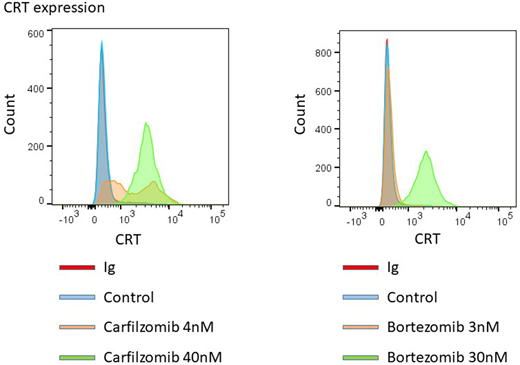Abstract
【Background and purpose】Introduction of novel drugs such as immunomodulatory drugs (IMIDs), and proteasome inhibitors has significantly prolonged survival of multiple myeloma (MM). However, MM harboring high-risk cytogenic changes such as del 17 and t(4;14) is still significantly associated with short survival. Immunotherapy including monoclonal antibodies against MM cells or chimeric antigen receptor expressing T cell (CAR-T) therapy has also showed excellent response to high-risk MM, although the cost of these treatments is expensive.
Some of conventional anti-cancer drugs, such as anthracyclines, have been reported to cause induction of immunomodulatory effects by cell surface expression of calreticulin (CRT) followed by release of high mobility group box 1 (HMGB 1) and ATP from cancer cells. Dendritic cells (DCs) recognize CRT, HMGB1 and ATP through CD91, TLR4, P2X7 receptors respectively, and take up cancer cells. This series of events is called immunogenic cell death (ICD). However, there is substantially no information on ICD in MM. The purpose of this study is to investigate whether anti-MM drugs can induce ICD.
【Methods】Myeloma cell line harboring high-risk cytogenetic changes, MUM24, KMS34, and KMS21 were treated with anti-myeloma drugs at the IC50, including dexamethasone(320µM), melphalan(2µM), lenalidomide(3.5µM), bortezomib(3nM), carfilzomib(4nM), and panobinostat(6nM). Expression of cell surface CRT and HMGB1 release, which are indicators of ICD, were detected using flow cytometry 48hr after drug treatment and western blotting 24hr after treatment, respectively. We also checked CRT expression on CD138+ cells derived from bone marrow samples of myeloma patients (n=3). Furthermore, the phagocytosis of drug-treated MM cells by DCs generated from healthy human peripheral blood mononuclear cells was evaluated by flow cytometry.
【Results / Discussion】Bortezomib and carfilzomib significantly induced expression of CRT and release of HMGB1 in MM cell lines and bone marrow CD138+ cells obtained from MM patients compared with other anti-MM drugs. Especially carfilzomib induced CRT expression at lower concentration. It was also observed that MUM24 cells treated with bortezomib or carfilzomib were effectively taken up by DCs compared to cells treated with other drugs.
【Conclusion】Our results suggest that proteasome inhibitors could not only directly kill MM cells but also induce anti-myeloma immune response via ICD. In particular, these immune effects are expected to improve the prognosis of patients in continuous therapy setting after induction therapies by evoking immune memories against residual MM cells, which might contribute to decrease recurrence or formation of extramedullary disease. Moreover, synergistic effects with other cancer immunotherapy such as immune checkpoint inhibitors and CAR-T therapy can be expected.
Hattori:IDAC inc.: Research Funding; Takeda: Research Funding. Matsushita:Amgen: Research Funding.
Author notes
Asterisk with author names denotes non-ASH members.


This feature is available to Subscribers Only
Sign In or Create an Account Close Modal